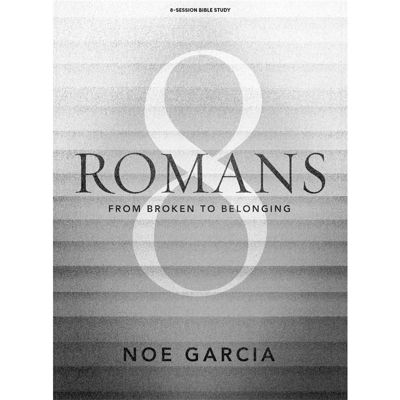Have you ever thought your life is beyond repair or wondered if God could use your brokenness for good? We all tend to look and search for purpose in our pain and suffering. Depression, anxiety, hurting relationships, and unmet expectations can cause us to question God.
In the Romans 8 Bible study, Noe Garcia takes participants on a journey through Romans 8, which many scholars believe is the greatest chapter in the Bible. Noe shares his life story and experiences of abuse, depression, and overwhelming hopelessness. He reveals how God redeemed, repaired, and restored him. Through Romans 8, he’ll help you understand Christ’s transformative power to repurpose hurt and brokenness for your good and His glory.
In the following teaching clip from the study, Noe talks about how his church became more unified as they became more diverse.
The video is above, and the complete transcript is below.
I took over North Phoenix Baptist church just about five years ago. And when I arrived here, the church was over 90% Caucasian. Now, that’s not a bad thing obviously. But I knew the church didn’t reflect the city. So, I began to pray and ask God: “What do we need to do?” I know this is God’s heart: that church is supposed to be a church for the city. It’s supposed to reflect the city that it’s in, and we weren’t doing that very well.
As I began to pray, I recognized something needed to take place if we were going to truly be a church for all people.
Now, here’s a phrase I’m going to give you, and it might scare you. But we found it to be true. I knew that we were going to have to be a “culturally relevant” church without being “biblically irrelevant.” That’s a tough balance. Sometimes, if we are not careful, we can say: “We’re going to be so culturally relevant, and we’re going to water down the gospel.” That’s not what we want. And then other times, we’re going to say: “We’re just going to preach the Word and let the Word reach the people.” Now that’s true, and the Word is powerful; however, I think God also wants us to understand the context in which He’s placed our church within.
I had to take this church-culture box that we had; it was really filled with a bunch of traditions that may have worked ten, fifteen, or even twenty years ago. I took this church-culture box, and I recognized that every single weekend, we expected people to leave their culture outside the church doors and conform to our culture on a Sunday morning. Well guess what? That didn’t work very well.
So, we exploded the box. We exploded the box so much because we wanted to reach people for Jesus.
Now again, we got a little more “culturally relevant.” We understood the context. We understood the style of worship needed to change a little bit. We understood that things needed to change if people were going to walk in these doors to hear the gospel of Jesus Christ. Let me tell you what didn’t change: Bible teaching. We preached the gospel. We preached the Word of God. And we stayed very faithful to who God was calling us to be.
We never lowered the standard of holiness, but we opened the window of grace.
This wasn’t easy because this meant that we had to cut some of our typical traditions. Some of those had to die, because here is the truth: sometimes we keep traditions, and these traditions, when they’re not biblical, we let them trump truth. But we took out these traditions that were not biblical. And we began to really form and create a church that anybody can walk in and hear the gospel.
Let me share with you what took place. The church exploded. It exploded not only in growth, but for me, most importantly, it exploded in diversity. It completely looks differently than it did five years ago. Last time we checked, we had eighty-two different languages represented in our congregation. The church went from over 90% Caucasian to probably 60/40; we’re so mixed. Politically, we’re split down the middle; we went from being a red church to a purple church. When you walk on the campus now, we have everything from a traditional service to a contemporary service to a Spanish service, to a Swahili service. Then, when you come into the main service, it’s diverse.
Here’s what I’ve seen: that even in the midst of so much diversity, unity is possible.
Although we are all so different on a Sunday morning, what brings us together is much stronger and much more powerful than what separates us. And what brings us together is the blood of Jesus Christ. That can unify anything and anyone. I want to encourage you. Look at your city.
Does your church reflect the city that God has placed you in? If it doesn’t, what is God calling you to do?
It may be hard, but you are the shepherd of this church. God has called you to lead the sheep to places they wouldn’t otherwise go on their own. See, I believe there are a lot of shepherds out there that are being led by the sheep. I want to encourage you with boldness: lean into your calling. Lean into your covering. Know that God has called you for this time and this city to be a place, to be a church, for the people in your city.
I hope this encourages you. Through the power of Jesus, you can do it.


